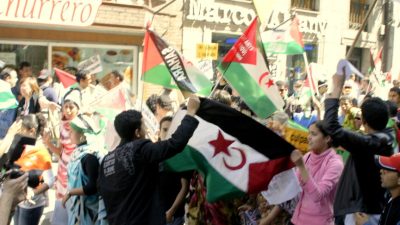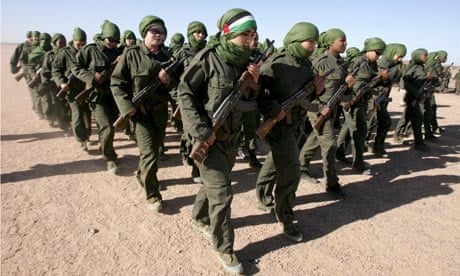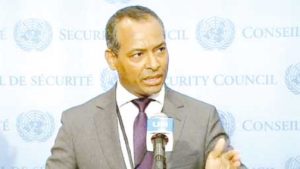Spain Abandons Former Colony in the Western Sahara Endorsing Morocco Domination
Polisario Front denounces the announcement by Madrid which is following the lead of the United States

All Global Research articles can be read in 51 languages by activating the “Translate Website” drop down menu on the top banner of our home page (Desktop version).
To receive Global Research’s Daily Newsletter (selected articles), click here.
Visit and follow us on Instagram at @globalresearch_crg and Twitter at @crglobalization. Feel free to repost and share widely Global Research articles.
***
Spain has announced that it has endorsed a proposal by the Kingdom of Morocco to designate the Sahrawi Arab Democratic Republic (SADR) as an “autonomous” region within the North African state.
Former United States President Donald Trump in 2020, recognized Moroccan control over the Western Sahara in an attempt to strengthen relations between the Kingdom and the State of Israel.
Formerly known as the “Spanish Sahara”, the people of the territory have been demanding national independence for decades.
All of the former colonies of Europe within the African continent have sought independence from the former imperialist masters. Although there are 55 African countries which are members of the African Union (AU) and the United Nations, the phenomenon of neo-colonialism has hampered genuine liberation and continental unification.
This recent proclamation by Spain is clearly a manifestation of the legacy of neo-colonialism, where even independent governments are subjected to the economic domination of the imperialist states. The most progressive states within the AU have supported the SADR in their struggle to win independence from Morocco.
The territory was ceded to Morocco and Mauritania after the exit of Spain as a colonial power in 1975. Mauritania relinquished its falsely designated authority over the Western Sahara, while the Kingdom of Morocco, one of the few remaining monarchies on the continent, has refused to allow the people of the territory to even conduct an internationally supervised and monitored election on the status of their own country.
Both the United Nations and the African Union (AU) has recognized the SADR as a government in waiting with a legitimate claim to represent the people of the de facto colony. The Western Sahara is the only country which has not been declared independent within the AU, whose predecessor, the Organization of African Unity (OAU) after contentious debate, has advocated for the total liberation of the Western Sahara for nearly four decades.
Nonetheless, in response to the seating of the SADR by the OAU/AU, Morocco withdrew its membership from the continental organization. However, several years ago, the Kingdom petitioned for readmission which was granted despite objections from several states including Algeria and the member-states of the Southern African Development Community (SADC).
The Polisario Front, the armed liberation movement which has been fighting for independence since 1973, rejected the recent shift in the position of Spain. The UN has been unable to ensure that Morocco holds a national referendum within the Western Sahara over the future of the territory.
This consistent failure on the part of the UN and the intransigence on the part of the U.S., the European Union (EU) and its collaborators within the AU and West Asia, has stifled the independence and sovereignty of the continent’s last remaining colony. Obviously, the economic interests of Europe and the U.S. has guided its position towards the right of oppressed nations to self-determination.
In fact, the European Council on Foreign Relation (ECFR) in a recent report noted:
“The surprise move came to light when King Mohammed VI (Morocco) revealed some of the contents of a private letter from Prime Minister Pedro Sanchez. The letter endorses Rabat’s position on Western Sahara, describing Morocco’s 2007 proposal for Sahrawi autonomy – which would integrate the territory into Morocco – as ‘the most serious, realistic, and credible’ basis for resolving the conflict. This follows a similar move by Berlin. In a bid to mend its own relations with Rabat, the German government described Morocco’s plan as an ‘important contribution’. Spain is now the strongest European supporter of Morocco’s autonomy plan – even in comparison to France, a close ally of Morocco. So far, Paris has refrained from using superlatives when endorsing the ‘serious and credible’ nature of the plan.”
These unscrupulous diplomatic maneuvers are part and parcel of the aggressive posture being displayed by the imperialist states. It must be viewed within the context of the efforts to expand the North Atlantic Treaty Organization (NATO) further into Eastern Europe. The Russian Federation intervention in Ukraine, which has gained significant support among the masses within the AU member-states, is taking place alongside the proliferation of Pentagon and EU troops on the African continent. The U.S. Africa Command (AFRICOM) and the French-coordinated Operation Barkhane have established permanent and temporary makeshift bases on AU soil.
Although France has threatened to downsize its presence in West Africa and is undergoing a diplomatic row with Algeria over the legacy of its colonial domination from 1830 to 1962, Paris does not want to relinquish its capacity to respond militarily when it believes that their economic interests in Africa are compromised. The presence of the Wagner Group, a Russian Federation military services company assisting the Central African Republic, Mali and other states on the continent, indicates the discontent with Washington and Paris. These military operations in Africa by the Pentagon and other NATO countries coincides with the worsening security situation where so-called “jihadists” are utilizing sophisticated armaments to undermine the stability of AU member-states.
The Polisario Front Has a Legitimate Struggle to Liberate the Sahrawi Nation
There has been a swift and terse response by the independence movement to the provocations of Spain related to its effort to bring political freedom to the Western Sahara. For many years the Polisario Front abided by a ceasefire in order to facilitate the long-promised UN-sponsored referendum on its status within the international community.
Polisario Front women fighters in formation
Algeria, which has been a longtime advocate for liberation movements on the continent, has continued to demand that the UN abide by its legal obligations with respect to the SADR. Algiers routinely challenges on a diplomatic level those entities which support the continued colonization of the Western Sahara.
In a recent report by Al Jazeera on the declaration by Spain the press agency emphasizes that:
“Algeria has recalled its ambassador from Madrid in protest at Spain’s decision to back a Moroccan autonomy plan for the disputed former Spanish colony of Western Sahara. Morocco sees Western Sahara, with rich phosphate resources and access to lucrative Atlantic fishing waters, as an integral part of its territory. A statement carried by Algeria’s official media on Saturday (March 19) condemned the ‘abrupt about-turn’ by Madrid, which had previously maintained neutrality in the decades-old conflict for the territory between Morocco and the Polisario Front independence movement.”
As far as the SADR and the Polisario Front are concerned, Spain continues to be the colonial power in the Western Sahara since they do not recognize the continued occupation by the Moroccan monarchy over their territory. Numerous international legal decisions and the authority of the UN and the AU are being violated by Rabat and its supporters among the imperialist governments of Europe and North America.
Image on the right: SADR Ambassador to United Nations Dr. Sidi Omar
SADR Ambassador to the United Nations, Dr. Sidi Omar, issued a public letter to Secretary General Antonio Guterres on the present situation saying:
“Regarding the status of Morocco in relation to Western Sahara, the General Assembly has deeply deplored ‘the continued occupation of Western Sahara by Morocco’ in its Resolutions 34/37 of 1979 and 35/19 of 1980, among others. It is worth noting that the condition of Western Sahara being both a Non-Self-Governing Territory on the UN agenda since 1963 and an Occupied Territory is compatible with international law and practice. In view of the above, Spain therefore still has legal, historical, and moral responsibilities towards the people of Western Sahara. As such, it is still accountable to the UN and to the Sahrawi people for the fulfilment of its responsibilities and ‘sacred trust’ obligations concerning the decolonization of the Territory in line with the provisions of Chapter XI of the UN Charter and relevant General Assembly resolutions. The Frente POLISARIO and the Government of the Sahrawi Republic (SADR) call upon Spain, as the de jure Administering Power of Western Sahara, to assume fully its legal and historical responsibility regarding the Territory and the destiny of its people.”
Therefore, according to the liberation movement and the provisional government, which is recognized by the UN and the AU, the question of the Western Sahara remains one of European domination over an oppressed people. The recent decision by Spain has no moral or legal weight and must be seen as yet another attempt to deny the right to self-determination, independence and sovereignty of the African continent.
*
Note to readers: Please click the share buttons above or below. Follow us on Instagram, @globalresearch_crg and Twitter at @crglobalization. Feel free to repost and share widely Global Research articles.
Abayomi Azikiwe is the editor of the Pan-African News Wire. He is a regular contributor to Global Research.
Featured image: Western Sahara solidarity demonstration in 2007; All images in this article are from the author unless otherwise stated



